Disrupting the status quo, fixing the cancer clinical trial conundrum
“We always have to disrupt the system when the system does not serve the greater good.”
Congressman Bobby Rush
Patient participation in cancer clinical trials remains abysmally low: a mere 3 percent of patients enroll in cancer clinical trials and minority participation is a fraction of that number. With approximately 600,000 people dying every year from cancer, change is essential to help patients find potentially life-saving cancer clinical trials and to help researchers enroll the patients they need in those trials to develop new therapies.
With this challenge in mind, Lazarex Cancer Foundation hosted a panel of thought leaders at the National Press Club in Washington, D.C. to explore new ideas, science and breakthrough programs to fix the dysfunctional system. Some of the biggest disruptors and innovators in the fields of oncology, patient advocacy and public policy discussed ways to make advancements in cancer research more accessible to ALL patients.
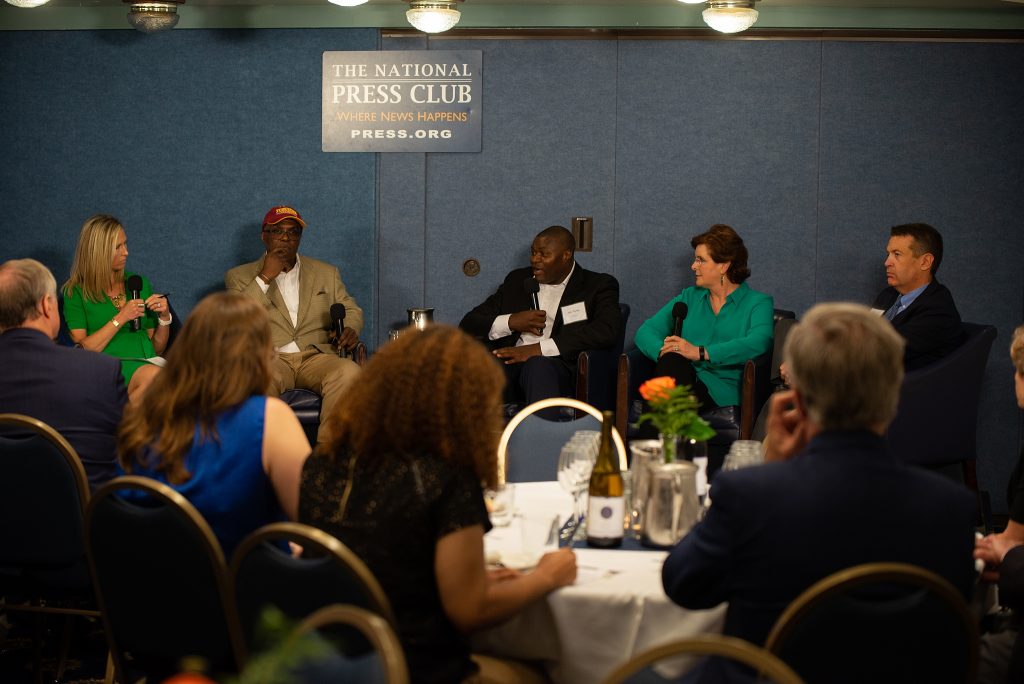
The event was a lively and educational forum promoting cutting-edge developments intended to increase participation, minority enrollment and retention in cancer clinical trials. Discussions focused on engaging patients and improving access and equity while serving ALL patients AND spurring innovation.
Breaking the Barriers to Advanced Medicine
“We need all hands on deck.”
Jude Ngang, Amgen
–
Is it feasible to bring cancer clinical trials into the community and engage patients where they live? In an effort to explore this critical question, the first panel of disruptors laid out current challenges:
- The majority of patients are seen in communities rather than academic centers, yet advanced treatment in cancer clinical trials is only offered in academic institutions.
- There is a lingering fear and mistrust of the research system for many minority populations.
- A scarcity of minority researchers negatively impacts enrollment.
- Unconscious racial bias impacts trial design and enrollment.
- Lack of technology and infrastructure in lower-income communities limits options for telemedicine.
- A lack of transportation options and the cost of transportation limit the ability of many to access cancer clinical trials and treatment.
Glenn Ellis, Sr., President, Strategies for Well Being says too many people are focused only on solutions and not addressing the root of the problem. “We have to ask ourselves, what is it that’s driving low minority participation and fix that first. We HAVE to disrupt the system if we are serious about change,” said Ellis.
Christian Downs, Executive Director of the Association of Community Cancer Centers said we need to set up the professional side for better success and, at the same time, have a better understanding of patients’ needs in each community; their strengths and their weaknesses. Downs continued, “If there are some things we can do that make it a positive experience, then you’ll see more people venturing into trials.”
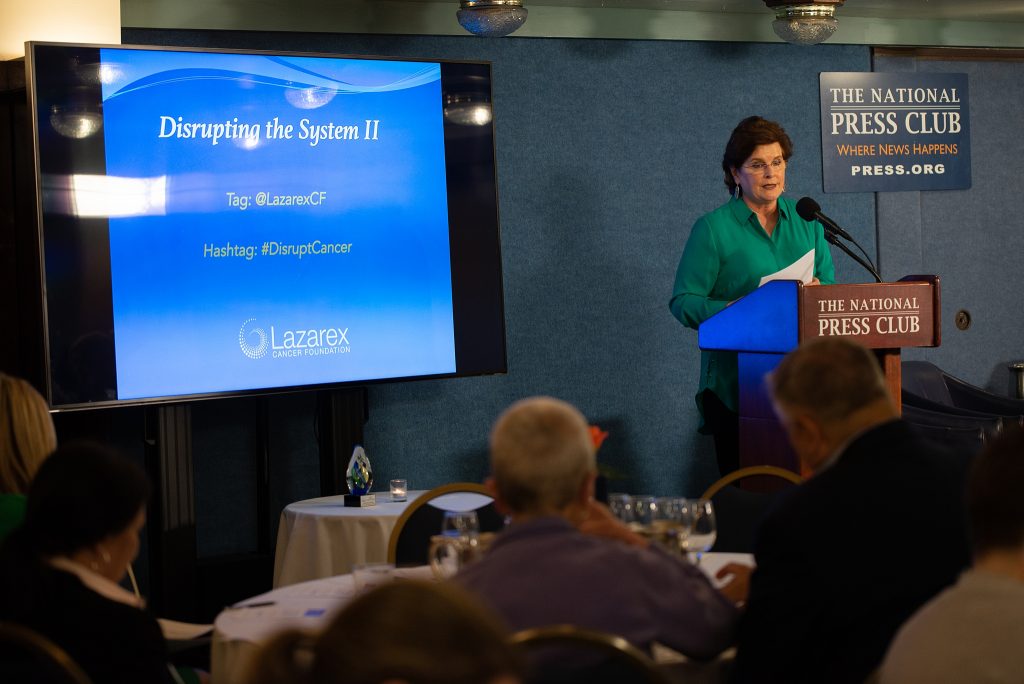
And there’s now proof he’s right. A new program is having that very effect. Lazarex Cancer Foundation’s IMPACT (IMproving Patient Access to Cancer Clinical Trials) program was introduced in 2018 at the University of Southern California Norris Comprehensive Cancer Center and at the University of San Francisco Helen Diller Comprehensive Cancer Center. Dana Dornsife, Founder of Lazarex, described the program, which provides assistance with costs for FDA cancer clinical trial participation, identification of cancer clinical trial options plus community outreach and education.
“The program is a game changer. It completely removes the financial aspect from the decision-making equation,” Dornsife explained.
Through a grant of $2 million from Amgen, Inc., the company became the founding sponsor of IMPACT, joining forces with Lazarex to bring this breakthrough program to life. “Amgen recognizes we have a part to play,” said Amgen’s Jude Ngang, “but we can only do so much because this is a multifaceted problem. We want to partner with as many folks as possible to really address this.”
IMPACT has shown measurable and astounding results. Dornsife said that since its launch, IMPACT has led to 74 percent minority participation and, in addition, 78 percent of participants came from households earning $25,000 or less.
“We ARE disrupting the system,” Dornsife said, to great applause.
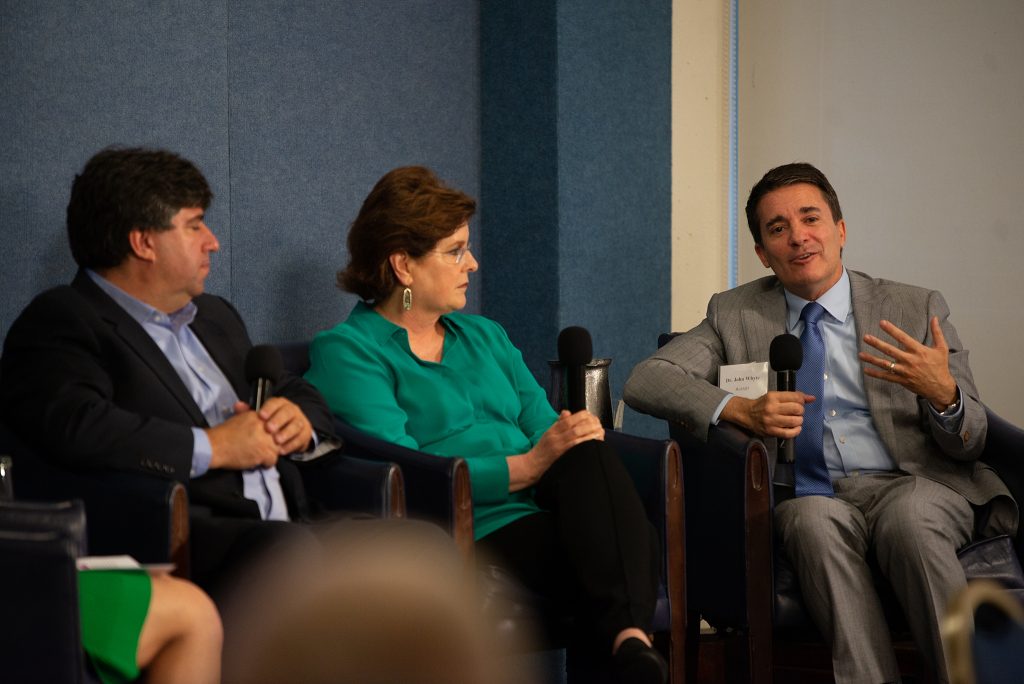
Democratizing Cancer Care
“In many ways, it’s little pieces of data that provide the whole picture of what’s going to work for a particular patient.”
John Whyte, MD, MPH, WebMD
To better understand how a patient develops cancer as well as how to devise the best option to treat that cancer, researchers are now examining a patient’s unique biological function by zeroing in on the “omics” – genomics, proteomics and metabolomics. The second panel of the evening sought to demystify the process of “omics” by delving into this groundbreaking innovation intended to further personalize treatment.
Chip Petricoin, Co-Founder of Perthera said multi-omic testing can democratize cancer care by helping patients find the drugs and treatments that are best matched for them. That data, Petricoin said, makes the process of finding a trial more direct for a patient and their oncologist and can help lower the financial burden for each patient. “Understanding a patient’s genomic sequence of their tumor is like going into battle and being able to rip up half the battle map.”
More than 30 percent of patients who have used Perthera’s analysis have accessed a cancer clinical trial, compared with the national average of about 3 percent.
“Where we are in genomics and the broader concept of ‘omics’ is very important because big data isn’t something that’s just necessarily going to solve the problems of cancer care,” John Whyte, MD, Chief Medical Officer of WebMD, explained.
However, this kind of innovation is worthless without patients. The panel discussed the need to raise awareness about multiomic testing and standardize it in order to enable everyone to equally benefit. Petricoin spoke of the ways Perthera is working to simplify and make it easier for people to access and embrace “omics” by offering “turn-key” solutions at no-cost for patients and their physicians. Currently, advocacy organizations and pharmaceutical companies pay for the company’s molecular profiling to better match patients with the best cancer clinical trials for them.
“You need companies like Perthera, that are out there aggregating and integrating and being the patient traffic control cop getting access to all this multi-omic data,” Petricoin explained. “There’s a lot coming over the hill. How does the ecosystem deal with that exploding amount of info? It will require these types of navigators that are truly trying to act on the patient’s behalf to get them to the right matched therapies.”
Celebrating the Disruptors
Lazarex honored Congressman Bobby L. Rush, D-IL, with the Lazarex Disruptor Award. A survivor of salivary gland cancer, he says cancer doesn’t run in his family so, he explained, it was a shock when he was diagnosed. But he says fighting cancer and triumphing over it has made him more aware of the issues and challenges for others who receive a cancer diagnosis. It’s also inspired him to be a change agent.
“We can’t accept the status quo when it comes to the health and well-being of our citizens.”
Congressman Bobby Rush
Congressman Rush received the Lazarex Disruptor Award for several recent efforts including his sponsorship of a congressional roundtable with Lazarex this month aimed at discussing ways to achieve minority equity in cancer clinical trials.
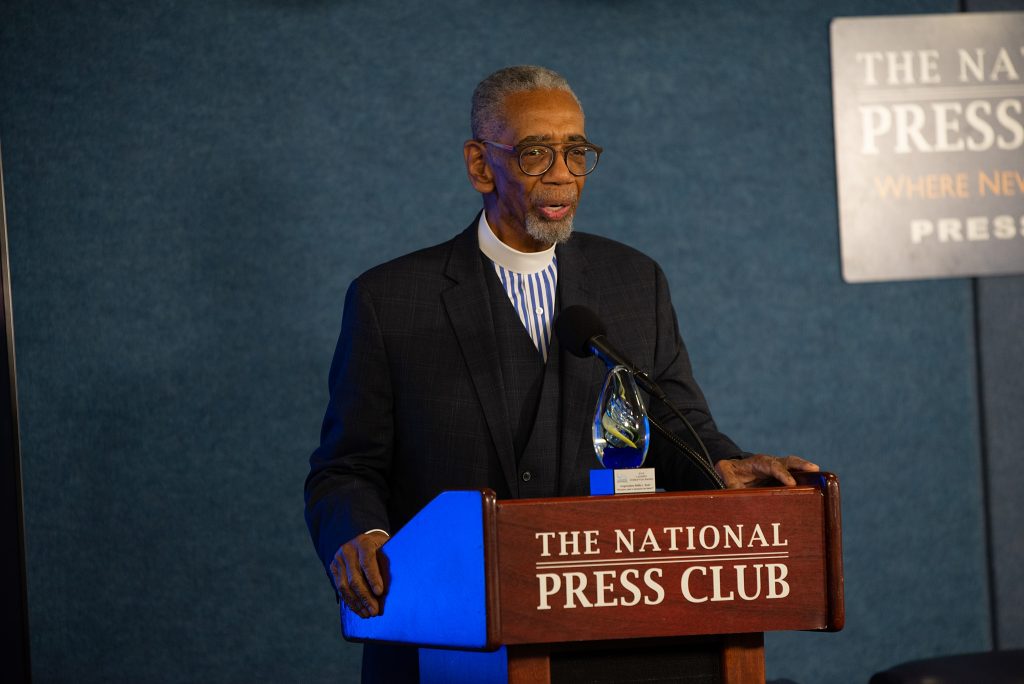
He is also helping to pass legislation in Illinois to clarify that providing reimbursement to patients for travel expenses associated with cancer clinical trials is not considered inducement or undue influence.
“Right now, so many patients are not included in the research and if they’re not included in the research than they’re not included in the remedies for cancer and other diseases,” Congressman Rush told the crowd.
Congressman Jamie Raskin, D-MD, also received the Lazarex Disruptor Award for his work to support the mission of Lazarex Cancer Foundation and help pave a path to change for all patients. Because of legislative action on Capitol Hill, he was unable to attend the Disrupting the System II event.
“Without Lazarex’s support, I truly would not be here.”
Jackie Hinkley, Cancer Survivor
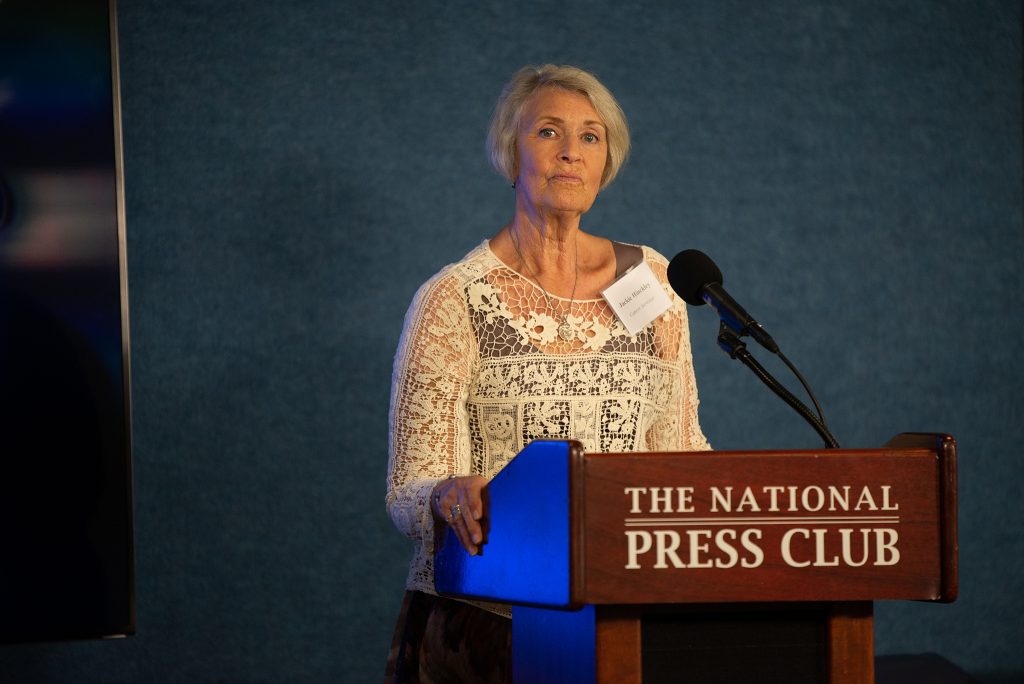
Jackie Hinckley, a Stage 4 breast cancer survivor, was another special guest at the event. She said that you have to be “super human” to get into a cancer clinical trial and that staying in a trial would have been impossible for her without Lazarex’s help. The California resident has been involved with four cancer clinical trials since 2015 and currently travels by Uber, bus and a red-eye cross-country flight once a month to Massachusetts for her life-saving treatment. She says she could never afford to do that without Lazarex’s assistance.
“I am alive today because of their financial support. I’m here to support cancer clinical trials and to thank Lazarex with all my heart,” said Hinckley.
Disruption in Action: Recent Successes
Lazarex Cancer Foundation has been engaged in intensive efforts at the state and federal levels to alleviate financial burdens faced by patients who wish to participate in cancer clinical trials.
June 19, 2019: Capitol Hill Congressional Roundtable leads to a promise of action to push for funding at the federal level and from pharmaceutical companies to help patients access cancer clinical trials in order to pave a path to greater innovation of new treatments for all patients. Roundtable participants included: Congressman Tom Cole, R-OK and Chairman of the Subcommittee on Labor Health and Human Services, Congresswoman Anna Eshoo, D-CA, Congressman Buddy Carter, R-GA, Congressman Mark DeSaulnier, D-CA, Congressman Bobby Rush, D-IL, and Congressman Greg Gianforte, R-MT.
June 16, 2019: Texas passes HB3147, joining California and Pennsylvania to make it easier and more affordable for patients battling cancer to participate in the cancer clinical trials that might be their best chance for survival. HB 3147, set to go into effect September 1, 2019, allows the Cancer Prevention Research Institute of Texas to allocate from its existing funds to reimburse cancer clinical trial patients’ travel expenses.
October 11, 2018: Pennsylvania passes HB126 clarifying that reimbursing patients for out-of-pocket expenses associated with a cancer clinical trial is not coercion.
January 25, 2018: Lazarex encouraged the FDA to change patient reimbursement guidance in cancer clinical trials and the FDA listened. The action, clarifying that reimbursing patients for participation in a cancer clinical trial is not considered coercion or inducement, continues to have an enormous impact.
Takeaways and Next Steps
The panels discussed several key elements that are necessary to improve access and participation in cancer clinical trials going forward including:
- Raising awareness of the lack of participation in cancer clinical trials including the impact of unconscious racial bias in participation.
- Partnering with communities to improve awareness of and access to cancer clinical trials.
- Pushing for legislative action in more states to address reimbursement and access for cancer clinical trial participants.
- Increasing pharmaceutical industry participation in the reimbursement process.
To watch the full 90-minute event, please use this link.




